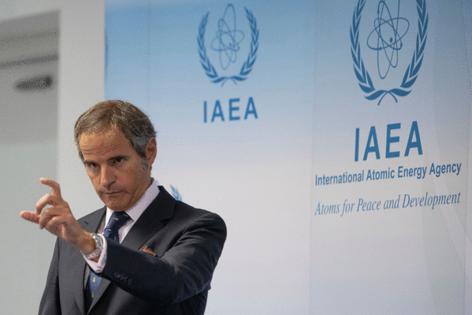UN nuclear watchdog says US-Iran talks are at crucial stage
Published in Political News
The head of the United Nations nuclear watchdog said talks between Iran and the U.S. are at a “crucial stage” and warned they have limited time to resolve their years-long standoff.
“There is a possibility of a good outcome but nothing is guaranteed,” Rafael Mariano Grossi, director general of the International Atomic Energy Agency, said in comments recorded during a visit to Tehran on Thursday and shared with Bloomberg. “We are multiplying our efforts to facilitate this process.”
Grossi’s visit comes days after the U.S. and Iran held their first talks aimed at striking an agreement over Tehran’s nuclear program. The stakes for global security and the oil market are high. U.S. President Donald Trump has threatened military action against the Islamic Republic if a deal isn’t reached in the coming weeks.
Saudi Arabia’s defense minister, Prince Khalid bin Salman, made a rare high-profile visit to Iran on Thursday and met Supreme Leader Ayatollah Ali Khamenei, the state-run Islamic Republic News Agency reported.
Prince Khalid delivered a message from Saudi Crown Prince Mohammed bin Salman addressed to Khamenei, IRNA said, without giving details on its contents. He is the highest-level Saudi royal to visit Iran in years, and his trip signals that Arab states are keen to avoid a new conflict in the region.
The IAEA’s Grossi said he has been in contact with the U.S.’s top Middle East envoy, Steve Witkoff, to see how the watchdog can “serve as a bridge between Iran and the U.S. and help achieve a positive outcome,” according to the IRNA.
While the U.S. and Iran are set to meet for a second round of talks on Saturday in Rome, they’ve already hit a stumbling block over the Trump administration’s position on Tehran’s ability to enrich uranium.
Iranian Foreign Minister Abbas Araghchi said earlier this week that U.S. has sent conflicting messages and these need to clarified when they meet again at the weekend.
Witkoff said on Tuesday that Iran had to eliminate its uranium-enrichment program altogether, rather than restrict it. He was backtracking on earlier comments that suggested Iran could still enrich to a low level for civilian uses.
Iran has said its ability to produce the fissile material is non-negotiable and says it’s allowed to enrich uranium under the terms of the Nuclear Non-Proliferation Treaty.
The 2015 nuclear deal that Trump abandoned during his first term imposed strict limits on the extent to which Iran was allowed to enrich uranium, in terms of both purity and quantity.
Iran started to breach those caps after Trump exited the accord in 2018 and placed stricter sanctions on the Islamic Republic.
_____
(With assistance from Eltaf Najafizada and Sam Dagher.)
_____
©2025 Bloomberg L.P. Visit bloomberg.com. Distributed by Tribune Content Agency, LLC.




























































Comments